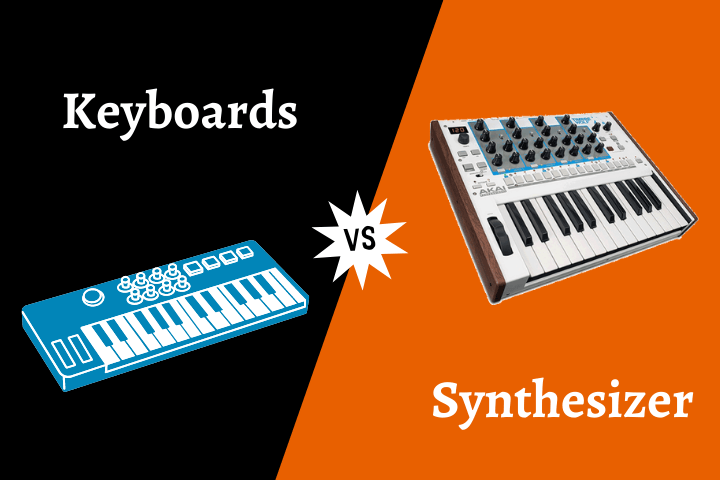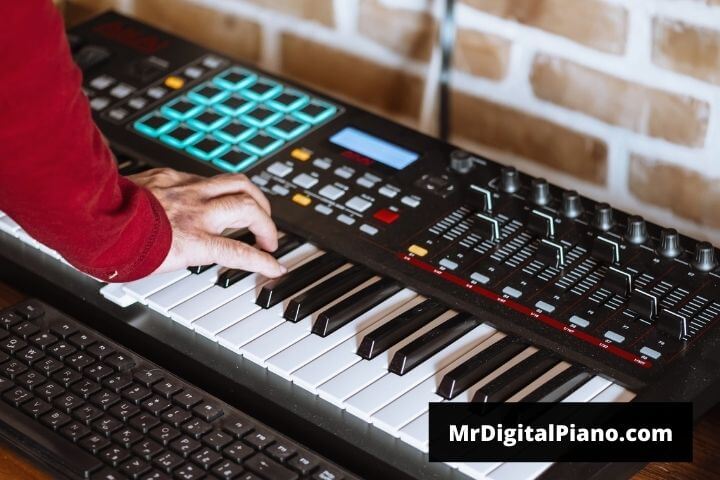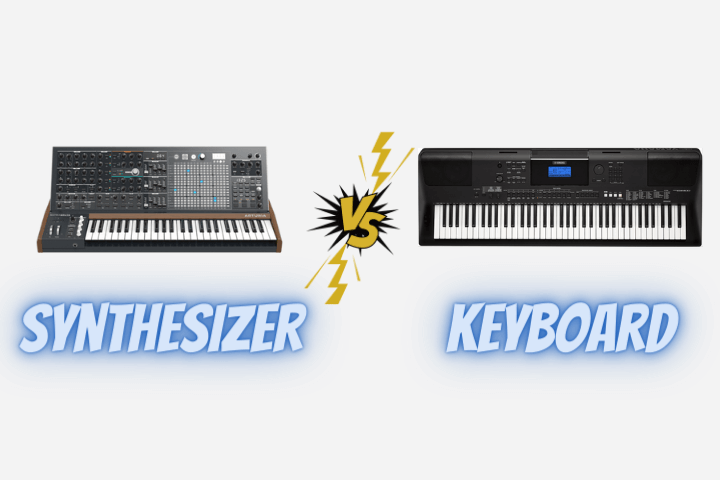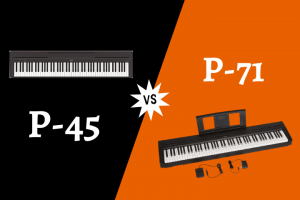Keyboard vs synthesizer, which is better? I bet this question has crossed your mind tons of times. However, due to the lack of information and knowledge in this regard, you might not have found a suitable answer. Don’t worry; we are here to answer all your queries. Both keyboards and synthesizers are lightweight devices that can be used for a sound generation; however, they are different from each other in terms of construction and abilities.

While keyboards are solely designed for sound generation, synths can also be used for sound alteration. Thus, offering more room for improvement. Moreover, keyboards are inexpensive and budget-friendly, while the latter are versatile but expensive in nature. Thus, making it difficult for consumers to make a choice. For this purpose, we have compiled a comparative review of the synthesizer vs. keyboard to offer you more information in this regard.
Keyboard vs. Synthesizer
What are Keyboards?
Keyboards are specialized instruments that can be plugged into the mains whenever required. The majority of these instruments available in the market come with built-in speakers that allow you to enjoy an unrivaled music experience. These keyboards resemble the acoustic piano; however, both have some significant differences.

The most famous among which includes the difference in the sound-producing source. The keyboards are incorporated with electric circuits as opposed to the piano and generate signals when a key is pressed. This whole process leads to the generation of different sounds depending on the type of signal produced. There are a variety of these instruments available in the market, depending on the price.
The pricer models might contain additional features; however, the mode of operation is more or less similar in all types. We highly recommend purchasing portable keyboards. Almost all the keyboards available in the market are lightweight and thus, can be carried around with ease without exerting additional effort.
These are ideal for beginners that do not have much experience in this regard and are looking for a suitable instrument to improve their skills. Similarly, professionals are also fond of keyboards and use them for solo performances as well as for composition purposes. However, they can not be used for adding diversity to a song as they have limited abilities and restrict the freedom of adjusting sounds in detail.
What are Synthesizers?
While keyboards are separate instruments, synthesizers can not be called an instrument; instead, they are present inside the keyboards in a variety of forms. Their structure and function can be simple and complex depending on the abilities and style of construction. A synthesizer acts as a controller and has a diverse range of applications. It is perfect for both stage and studio use, unlike its previously mentioned counterpart.

The most highlighting feature of a synth is the ability to make precise changes while working on different sounds. A synthesizer can also be referred to as a collection of sounds. These sounds can be tweaked and adjusted depending on the requirement and enable you to experiment on a daily basis.
Apart from this, these products are available in two major types, namely creative synth and imitator synth. Both these types have their own associated features and, thus, can be purchased depending on the requirement. Creative synthesizers are recommended for the purpose of modifying existing sounds.
They offer room for improvement and are integrated with multiple buttons and knobs that can be used to perform the task. In contrast, the latter is more concealed, and you can view everything on an LCD screen. However, synthesizers have their own limitations as they are not incorporated with built-in speakers and can only transfer the sound directly to the headphones.
Difference Between Synthesizer and Keyboard

Design
The design of a keyboard and synthesizer vary significantly from each other. As mentioned earlier, the keyboard is a separate instrument that can be used for solo music composition as well as for beginner learning purposes. If you are not skilled in the field and want to improve your skills, this is our ultimate recommendation to you.
In design, it resembles an acoustic piano and is generally incorporated with an electronic circuit. The whole process works by the generation of the signals that lead to the formation of the sound when you press a key. Furthermore, keyboards are integrated with multiple keys, which produce different signals and contribute to the generation of varying sounds in the process.
In contrast, a synthesizer is not an instrument but a major component of a keyboard or a piano and is also known as the collection of sounds. There are multiple types of synthesizers available in the market, as discussed earlier, and can be used to generate new sounds or make changes in the already existing sounds. They are complex in structure as compared to the keyboards and are also incorporated with LCD screens that can be used for displaying various sounds.
Price
The price is another factor that varies greatly among keyboards and synthesizers. Synthesizers are extremely expensive in nature and can cost you a lot even if you purchase a low-end product. On average, the most inexpensive synthesizers are available in the market at the price of around $1200, which might not be affordable by the majority of consumers.
In comparison, keyboards are budget-friendly and thus can be purchased at an extremely reasonable price around the market. There are expensive models as well that can cost somewhere around the price of their previously mentioned counterparts. However, the affordable options range from $25 to $40.
Sound
Next up on the list is the sound. Synthesizers do not contain built-in speakers, and thus, the sound is directly transmitted to the headphones while using these products. The majority of the analog synths available in the market feature built-in sounds and can be used for modification and mixing purposes. They offer enhanced precision and accuracy and thus, are perfect for both studio and stage use.
Another prominent attribute of these models is their ability to work without any external device. Keyboards, on the other hand, are integrated with built-in speakers and are more beneficial for learning purposes or composing solo music. They are not recommended for mixing and matching because of their limited abilities. Furthermore, they lack built-in sounds and thus, are dependent on external devices for this purpose.
Controls
Synthesizers also take the crown when it comes to control. They feature multiple controlling systems and are also known as control agents. The function of a synthesizer is to modify or alter a new sound or an already existing sound. For this purpose, they utilize oscillators and envelope controls which are famous built-in components of a synth.
Moreover, built-in feature effects like delay, distortion, and chorus are also utilized by some models for diversity. On the other hand, the controls of a keyboard vary from model to model. While some are available in the form of multiple controls like sliders and knobs etc., others are only integrated with keys that are the only source of sound generation.
Keyboard v/s Synthesizer: Which is Better?
Both keyboards and synthesizers have been discussed earlier in detail, along with their major differences in terms of sound, controls, price, brands as well as various applications. The choice about which is better usually depends on the consumer’s preferences. If you are looking for a product for learning purposes, we recommend going for a keyboard as it can produce multiple sounds and can help you analyze different sounds.
Furthermore, it is easier to use as compared to a synthesizer and is also less expensive. Thus, it can be purchased by a wide variety of consumers. In contrast, synthesizers are more expensive and versatile as compared to their previously mentioned counterparts. They can be used for both stage and studio purposes and are also known as control agents. These products can be used for the purpose of mixing and matching and for altering new and already existing sounds.
Professionals mostly use synthesizers for enhanced precision and accuracy while composing a new musical score. Hence, they are highly recommended if you are one of those that want diversity and accuracy. However, they are expensive in nature and cost a lot as compared to keyboards. So, you should be extremely careful when making a decision about which one you should choose when it comes to staging performance.
Both the above-mentioned instruments have their own disadvantages as well. While keyboards are integrated with built-in speakers, they do not have much significance in terms of stage performance. Even in studios, they are only used for composing solo scores and are not usually utilized by professionals. Similarly, the synths are limited by the lack of built-in speakers and their high price, which significantly impacts their overall market demand.
We recommend analyzing your needs beforehand and keeping the purpose of purchase in mind before you set out to choose an instrument for yourself. If your ultimate goal is the improvement of skill, we suggest going for budget-friendly yet performance-efficient keyboards that are specifically designed for this purpose. However, if you want to synthesize new sounds or make sound adjustments, then it is preferable to go for a synthesizer to avoid unwanted troubles or diversity concerns in the end.
Frequently Asked Questions
Why are musicians so obsessed with synthesizers?
There are a variety of synthesizers available in the market, the most common among which includes an analog synthesizer that is integrated with an electronic circuit. Furthermore, these synths also contain various built-in effects like distortions, noise, drifts, etc., that can be used to alter the already existing sounds. They also offer more room for adjustment in terms of amplitude, vibration, and frequency. Therefore offering enhanced versatility to music. Thus, making them their ultimate choice for mixing and matching purposes.
Why are analog synthesizers so expensive?
Analog synthesizers are incorporated with a variety of analog components along with electronic circuits that can be used to generate or modify sounds. Furthermore, they also contain various filters and effects such as distortions, modulation, envelopes, etc. All these components and small details combine together to increase the overall cost of an analog synthesizer. Moreover, the prices also vary from model to model and are also highly dependent on the manufacturer.
Can you use a synthesizer as a MIDI controller?
Yes, synthesizers are also known as controllers and can be used for creating and transmitting MIDI data. The majority of the analog synthesizers available in the market are incorporated with MIDI ports or USB ports that can be used for the purpose of data transmission. Similarly, if your syntax lacks the specified port, you can always attach an external MIDI or USB converter for this purpose. We assure you, you will have no problem while using it as a MIDI controller.
How is sound generated on a keyboard?
The keyboards are embedded with electronic circuits that are responsible for producing noise when a signal is generated. The generation of the signal is attributed to the keys located on top of the keyboard. When you press a key, it leads to the generation of a signal which in turn produces a sound. Each key generates a different signal, and thus, varying sounds are produced when different keys are pressed.
Wrapping Up
Both keyboards and synthesizers are renowned instruments available in the market and have their own advantages and disadvantages. While keyboards are budget-friendly and lightweight in design, they are usually dependent on external devices for sounds and are not suitable for stage use despite the inclusion of built-in speakers.
Synthesizers, on the other hand, contain built-in sounds and are versatile in nature. They can be used for both stage and studio applications and are perfect for modifying sounds. However, they are expensive in nature and might not be affordable by the majority. Thus, you should be extremely careful while choosing these musical instruments for yourself.
![Alesis Recital Pro Review 2023 [88 Key Piano Keyboard] alesis recital pro 88 key](https://mrdigitalpiano.com/wp-content/uploads/2022/01/alesis-recital-pro-88-key-300x200.jpg)
